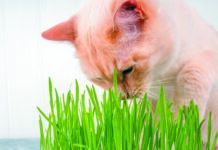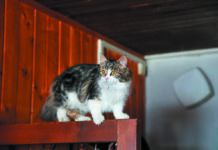Q: What’s the deal with a cat’s saliva? Does it have deodorizing properties? Does it help heal a wound? Or is it simply loaded with nasty bacteria?
Tanya DeKona
Takoma Park, Maryland
Dear Ms. DeKona,
A: In certain ways feline saliva is pretty amazing, which is a good thing since cats spend so many of their waking hours licking themselves.
In hot weather, cats remain comfortable by licking their fur. The saliva evaporates to cool the body. Saliva also helps loosen debris on a cat’s coat that he then scrapes off with his barbed tongue and in that way acts as a detergent.
Additionally, saliva can help speed the healing process — up to a point. At the very least, licking a cut can feel soothing. But cat spit is also said to have chemicals that fight harmful bacteria. Other beneficial substances postulated to be contained in cat saliva include growth factors that promote healing, natural opioid-like pain relievers, and virus fighters.
But here’s the up-to-a-point part. If a cat licks his wound and then stops, the saliva could do some good. But feline saliva also has nasty bacteria that could be harmful. Thus, if he keeps licking, he may be introducing harmful pathogens into the wound. What it boils down to is that you have to watch the degree to which your cat licks a particular spot. If he has a small cut or other lesion and does a little licking here and there and the wound is closing up, it’s probably fine. It’s like a mild antiseptic that you have on hand in the medicine cabinet. But if he starts going at the spot vigorously and it’s looking worse, get him to the veterinarian. The “medicine” he has on hand is not going to do the trick, and he will probably need a prescription.




